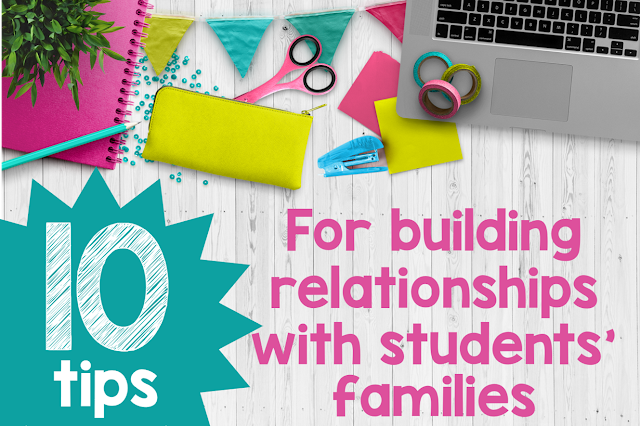families, family, family communication, teacher inspiration, teacher tips, teaching tips, tips for teachers
10 Tips for Building Relationships with Families
When I started “Family February” I was a little worried that I wouldn’t be able to write that many posts about one topic – I should’ve known better. Not only are families a huge piece of the work that we do – because children’s lives are so highly influenced by the experiences of their families – but I also love love love family engagement.
I know it’s technically March, but I want to wrap up my Family February with a little bit of a summary. So here are 10 tips for building those relationships with families:
- Be available – If a family member needs to talk to you find a time to make sure you can have that conversation. Drop off and pick up times can be crazy so take extra care to really pay attention to what parents are saying (or not saying) during these times.
- Be open – consistent communication is the key to any great relationship. In the classroom this means making sure daily sheets are filled in completely, sending home accurate and up to date newsletters, using technology to share photos throughout the day, and sharing cute stories when parents pick up.
- Ask for help – make sure that parents know they are a valued part of your classroom community. Whether you need help planning a class party or you need new strategies for their child’s behaviors, ask parents for their input.
- Share information – As much as they hate to admit it, parents don’t know everything. When it comes to child development you are the expert, so share what you’ve learned! Whether you choose to share personal anecdotes or printouts from trusted sources, most parents will appreciate any tips and tricks that you can give them.
- Smile – Seriously, people are more likely to approach others who look friendly.
- Make it fun – Use special events as a way to get to know your families, sit with them while they eat or do activities. Send home projects that families can work on together and encourage them to express their personalities. These experiences will teach you more about your families than any survey or questionnaire.
- Offer opportunities for them to get to know you – You are a person outside of school, and when families recognize this they have an easier time relating to you. Post an all about me sheet or send home a letter about yourself. Introduce the children to one of your hobbies and then share photos of the experience with parents.
- Use conference time wisely – Conferences may be the only opportunity that you get to talk to family members when there are no other distractions. Prepare for this time by making sure that you know what you want to talk to them about and have any resources that you want to share ready.
- Go above and beyond – Find little ways to help parents out. Make sure children have shoes and coats on when parents arrive so they can get out the door easy, gather all of the child’s things and have them packed up and ready to go. These little things make a huge difference when parents are in a hurry.
- Don’t give up – Some parents are harder to reach than others. Continue to be your smiley helpful self and give that parent the same amount of attention as the others, even when you’re frustrated by their attitude or lack of response. Remember that you are the professional in this situation, the parent may eventually surprise you!
I hope that these tips are helpful, you can review all of my Family February posts here!



